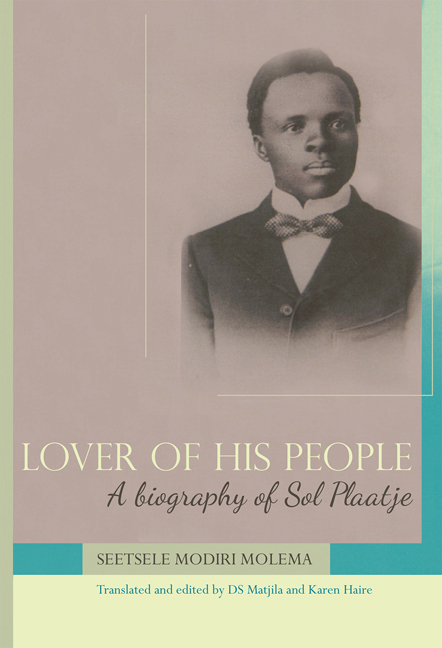Book contents
- Frontmatter
- Contents
- Acknowledgements
- Preface
- Foreword: Seetsele ModiriMolema: A star
- Chapter One First Encounter and Acquaintance
- Chapter Two Early Days and Youth
- Chapter Three An Unforgettable Year: 1896
- Chapter Four Life's Challenges
- Chapter Five Plaatje, The Career Journalist
- Chapter Six Government News
- Chapter Seven Conventions and Writings
- Chapter Eight Delegations and Meetings
- Chapter Nine Last Meetings and Travels
- Chapter Ten The Last Encounter
- Chapter Eleven Plaatje in His Own Words: English Extracts
- Chapter Twelve Plaatje in His Own Words: Setswana Extracts
- Seetsele Modiri Molema of the Mahikeng Molemas
- Bibliography
Seetsele Modiri Molema of the Mahikeng Molemas
Published online by Cambridge University Press: 16 March 2018
- Frontmatter
- Contents
- Acknowledgements
- Preface
- Foreword: Seetsele ModiriMolema: A star
- Chapter One First Encounter and Acquaintance
- Chapter Two Early Days and Youth
- Chapter Three An Unforgettable Year: 1896
- Chapter Four Life's Challenges
- Chapter Five Plaatje, The Career Journalist
- Chapter Six Government News
- Chapter Seven Conventions and Writings
- Chapter Eight Delegations and Meetings
- Chapter Nine Last Meetings and Travels
- Chapter Ten The Last Encounter
- Chapter Eleven Plaatje in His Own Words: English Extracts
- Chapter Twelve Plaatje in His Own Words: Setswana Extracts
- Seetsele Modiri Molema of the Mahikeng Molemas
- Bibliography
Summary
The reader of this heart-warming biography will want to know about its author, his life and the family he came from. Seetsele belongs to the Molemas of the Boo-Tshidi Barolong royal house, the most prominent family after the kgosi. Acknowledged founders of Mahikeng, they also pioneered education and Christianity among the Batswana and have been, definitively, guardians of the Barolong Batswana and, more broadly, black South African history. This essay, which opens with a short sketch of Seetsele's life, speaks to these important roles the Molema family has played.
SEETSELE'S LIFE
In his professional life, Seetsele Modiri Molema (1891-1965) is remembered as a well-liked and kind-hearted doctor and surgeon. Privileged to attend Healdtown and Lovedale, the best schools in South Africa, as a young man and before going overseas he was engaged in the cultural way, and later married the daughter of Reverend Moshoele, secretary to Kgosi Montshiwa, his great uncle. One of the brightest South African scholars of his day, Seetsele completed his medical studies in record time at Glasgow University, publishing, a year later in 1920, a landmark history, Bantu Past and Present: An Ethnographic and Historical Study of the Native Races of South Africa. Returning from his seven years abroad in Scotland and Ireland, where he did his medical internship, Seetsele lived most of his life in Mahikeng, although he also travelled abroad. After his first wife's death, he married a German woman, Lucretia Hommel, and together they raised two children. Seetsele, like Plaatje and like all black South Africans historically – and until very recently – was all too familiar with racial bigotry. As a surgeon operating on white patients in Mahikeng hospital he was to feel the barbs painfully in the refusal of white nurses to work under him. While Seetsele won a case against them and the nurses were obliged to pay his legal fees, the white community of Mahikeng rallied round their white nurses in solidarity, to pay the bill. This experience speaks to the effect of politics on personal life. It is thus natural, even fitting, that writers like Seetsele used a form of ethnography in writing history.
- Type
- Chapter
- Information
- Lover of his PeopleA biography of Sol Plaatje, pp. 109 - 120Publisher: Wits University PressPrint publication year: 2013



